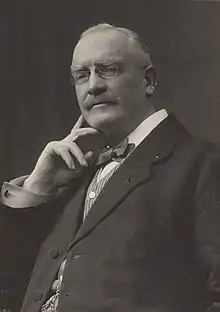
Rt Hon. Sir Daniel Ford Goddard PC JP (17 January 1850 – 6 May 1922[1]) was a British civil engineer,[2] businessman and Liberal Party politician who served as a Member of Parliament (MP) for Ipswich from 1895 to 1918. He was also Mayor of Ipswich from 1891 to 1892.
Background
Goddard was the son of Ebenezer Goddard, C.E., J.P., of Ipswich, Suffolk, and his wife Annie, née Ford. He was educated privately at Ipswich and then at Hastings under Dr Martin Reed.[3] He married Lucy Corsbie in 1874. She died in 1875, and in 1877 he married Elizabeth Harwood.[2] Both his father and grandfather occupied the post of engineer for the Ipswich Gas Company.[4]
Professional career
In 1867 Goddard was articled to Messrs E. R. and J. Turner, engineers, Ipswich. He was an associate member of the Institution of Civil Engineers. He studied Chemistry with Professors Sibson and Heisch in London and Newcastle. He worked as an Assistant Engineer from 1872 to 1877[5] and then succeeded his father as Engineer and Secretary of the Ipswich Gas Company from 1877 to 1887. He was a director of several companies. He was Chairman of Directors for the Ipswich Gas Company from 1887.[6] In 1896 he founded and built the Ipswich Social Settlement.[7]
Political career
_photographed_c.1911_or_earlier.jpg.webp)
Goddard was first elected to Ipswich Borough Council in 1886 serving until 1895. He was appointed an alderman of Ipswich in 1895,[2] and served as the town's mayor from 1891 to 1892.[8] In 1892 he was appointed as a Justice of the peace for Ipswich.[5]
At the 1892 general election, he stood for Parliament as one of two Liberal candidates in the dual member constituency of Ipswich. He stood in tandem with Arthur Soames. The Liberals had not won Ipswich since 1885. They failed to dislodge either of Ipswich's two Conservative MPs.[9] He won the seat in 1895.
Unsurprisingly, as a local man and former city mayor, Goddard polled 167 votes more than his running mate, Soames. Three years later, Goddard and Soames had another opportunity to unseat the Conservatives at the 1895 general election. Goddard was successful, topping the poll, but Soames was third, 43 votes behind the leading Conservative. At the 1900 general election, Goddard sought re-election and this time had a new Liberal running mate in Noel Buxton. Goddard again topped the poll but again, the sitting Conservative MP came second ahead of Buxton. For the 1906 general election, Goddard stood again as Liberal candidate and again with a new Liberal running mate in Felix Cobbold. Unlike Soames and Buxton, Cobbold had stronger ties to Ipswich, making him a better fit as candidate. Goddard and Cobbold were both easily elected in the year of the Liberal landslide. Once again, Goddard topped the poll. In 1907 Dod's Parliamentary Companion described him as being in favour of electoral reform, poor law reform, licensing reform, the disestablishment of the State Church in Wales and the abolition of the House of Lords veto.[3]
Goddard was knighted on 16 December 1907 [10]
His Ipswich colleague Felix Cobbold died in December 1909 just weeks before the January 1910 general election. The Liberals selected Silvester Horne to run with Goddard at the election. Both seats were retained with Goddard at the top of the poll. The two repeated their January 1910 election victory at the general election of December 1910, with Goddard topping the poll.
In 1914, Silvester Horne died suddenly causing a vacancy. The 1914 Ipswich by-election was set to elect his replacement. The Liberals chose government minister Charles Masterman as candidate. Masterman, who had no connection with Ipswich, had lost his seat earlier in the year and was in a hurry to get back into parliament. However, the by-election went badly for the Liberals and a Unionist won the seat.
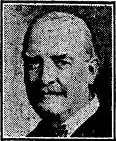
Another general election was required to take place before the end of 1915. He had been re=selected to run again as Liberal candidate for Ipswich. However, due to the outbreak of war in 1914, the election was deferred. He was sworn in as a Privy Councillor on 27 Jan 1916.[11]
He continued as an MP until the 1918 general election, when Ipswich's parliamentary representation was reduced to one seat and he did not seek re-election.[12] Although only 68, he did not stand for parliament again,[13] and died four years later.
Electoral record
| Party | Candidate | Votes | % | ±% | |
|---|---|---|---|---|---|
| Conservative | Charles Dalrymple | 4,350 | 26.2 | -0.4 | |
| Conservative | Hugo Charteris | 4,277 | 25.8 | -0.9 | |
| Liberal | Daniel Ford Goddard | 4,054 | 24.5 | +1.0 | |
| Liberal | Arthur Wellesley Soames | 3,888 | 23.5 | +0.3 | |
| Turnout | 8,417 (est) | 89.7 | +7.9 | ||
| Registered electors | 9,619 | ||||
| Majority | 223 | 1.3 | -1.8 | ||
| Conservative hold | Swing | -0.7 | |||
| Conservative hold | Swing | -0.6 | |||
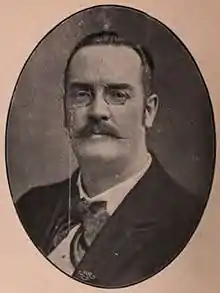
| Party | Candidate | Votes | % | ±% | |
|---|---|---|---|---|---|
| Liberal | Daniel Ford Goddard | 4,396 | 25.6 | +1.1 | |
| Conservative | Charles Dalrymple | 4,293 | 25.0 | -1.2 | |
| Liberal | Arthur Wellesley Soames | 4,250 | 24.8 | +1.3 | |
| Conservative | Hugo Charteris | 4,219 | 24.6 | -1.2 | |
| Turnout | 8,696 (est) | 90.4 | +0.7 | ||
| Registered electors | 9,619 | ||||
| Majority | 177 | 1.0 | n/a | ||
| Liberal gain from Conservative | Swing | +1.2 | |||
| Majority | 43 | 0.2 | -1.1 | ||
| Conservative hold | Swing | -1.3 | |||
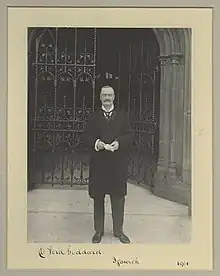
| Party | Candidate | Votes | % | ±% | |
|---|---|---|---|---|---|
| Liberal | Daniel Ford Goddard | 4,557 | 25.9 | +0.3 | |
| Conservative | Charles Dalrymple | 4,527 | 25.8 | +0.8 | |
| Liberal | Noel Buxton | 4,283 | 24.4 | -0.4 | |
| Conservative | J. F. P. Rawlinson | 4,207 | 23.9 | -0.7 | |
| Turnout | 83.6 | -6.8 | |||
| Registered electors | 10,646 | ||||
| Majority | 350 | 2.0 | +1.0 | ||
| Liberal hold | Swing | -0.5 | |||
| Majority | 244 | 1.4 | +1.2 | ||
| Conservative hold | Swing | +0.6 | |||
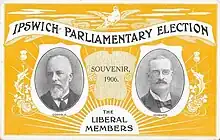
| Party | Candidate | Votes | % | ±% | |
|---|---|---|---|---|---|
| Liberal | Daniel Ford Goddard | 6,396 | 29.8 | +3.9 | |
| Liberal | Felix Cobbold | 6,290 | 29.2 | +3.8 | |
| Conservative | Charles Dalrymple | 4,591 | 21.3 | -4.5 | |
| Conservative | Samuel Hoare | 4,232 | 19.7 | -4.2 | |
| Majority | 1,699 | 7.9 | +5.9 | ||
| Turnout | 89.4 | +5.8 | |||
| Registered electors | 12,146 | ||||
| Liberal hold | Swing | +4.2 | |||
| Liberal gain from Conservative | Swing | +4.2 | |||
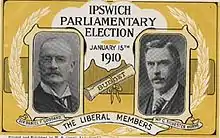
| Party | Candidate | Votes | % | ±% | |
|---|---|---|---|---|---|
| Liberal | Daniel Ford Goddard | 6,120 | 26.1 | -3.7 | |
| Liberal | Silvester Horne | 5,958 | 25.5 | -3.7 | |
| Conservative | Arthur Churchman | 5,690 | 24.3 | +3.0 | |
| Conservative | Bunnell Henry Burton | 5,645 | 24.1 | +4.4 | |
| Turnout | 93.3 | +3.9 | |||
| Registered electors | 12,641 | ||||
| Majority | 268 | 1.2 | -6.7 | ||
| Liberal hold | Swing | -3.4 | |||
| Liberal hold | Swing | -4.1 | |||
| Party | Candidate | Votes | % | ±% | |
|---|---|---|---|---|---|
| Liberal | Daniel Ford Goddard | 5,931 | 26.2 | +0.1 | |
| Liberal | Silvester Horne | 5,791 | 25.7 | +0.2 | |
| Conservative | Arthur Churchman | 5,447 | 24.1 | -0.2 | |
| Conservative | Bunnell Henry Burton | 5,409 | 24.0 | -0.1 | |
| Turnout | 89.9 | -3.4 | |||
| Registered electors | 12,641 | ||||
| Majority | 344 | 1.6 | +0.4 | ||
| Liberal hold | Swing | +0.2 | |||
| Liberal hold | Swing | +0.2 | |||
References
- ↑ "Historical list of MPs: constituencies beginning with "I"". Leigh Rayment's House of Commons pages. Archived from the original on 20 December 2009. Retrieved 11 January 2010.
{{cite web}}: CS1 maint: unfit URL (link) - 1 2 3 "Debrett's House of Commons and the judicial bench, 1901". London: Dean & son. p. 100. Retrieved 12 January 2010.
- 1 2 Dod's Parliamentary Companion, 1907
- ↑ "Obituary: Ebenezer Goddard, 1816-1882". Minutes of the Proceedings of the Institution of Civil Engineers. Institution of Civil Engineers. 72 (1883): 312–314. January 1883. doi:10.1680/imotp.1883.21779. Retrieved 14 March 2020.
- 1 2 The Liberal Year Book, 1907
- ↑ "Goddard, Rt Hon. Sir Daniel Ford, (17 Jan. 1850–6 May 1922), PC 1916; JP". Who's Who & Who Was Who. 2007. doi:10.1093/ww/9780199540884.013.U196978.
- ↑ Debrett's House of Commons and Judicial Bench, 1916
- ↑ "Mayors of Ipswich: 1836 to the present day". Ipswich Borough Council. Archived from the original on 16 July 2011. Retrieved 12 January 2010.
- ↑ Craig, F. W. S. (1989) [1974]. British parliamentary election results 1885–1918 (2nd ed.). Chichester: Parliamentary Research Services. pp. 124–125. ISBN 0-900178-27-2.
- ↑ "No. 28092". The London Gazette. 24 December 1907. p. 8979.
- ↑ "Privy Counsellors 1915–1968". Leigh Rayment's peerage pages. Archived from the original on 7 June 2008. Retrieved 12 January 2010.
{{cite web}}: CS1 maint: unfit URL (link) - ↑ Craig, F. W. S. (1983) [1969]. British parliamentary election results 1918–1949 (3rd ed.). Chichester: Parliamentary Research Services. p. 154. ISBN 0-900178-06-X.
- ↑ British Parliamentary Election Results 1918-1949, FWS Craig.
- 1 2 3 4 5 6 Craig, FWS, ed. (1974). British Parliamentary Election Results: 1885-1918. London: Macmillan Press. ISBN 9781349022984.
- 1 2 Debrett's House of Commons & Judicial Bench, 1916